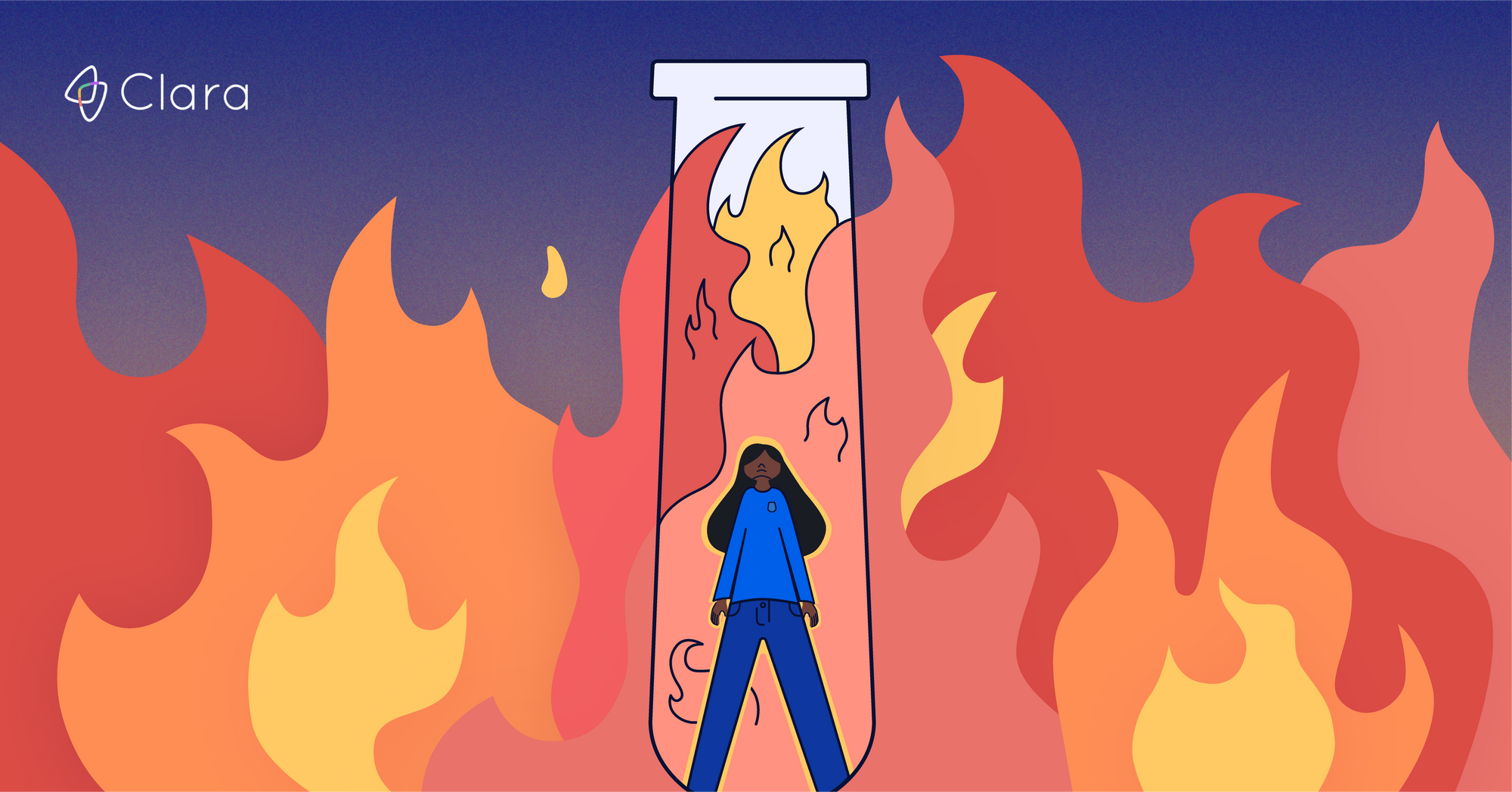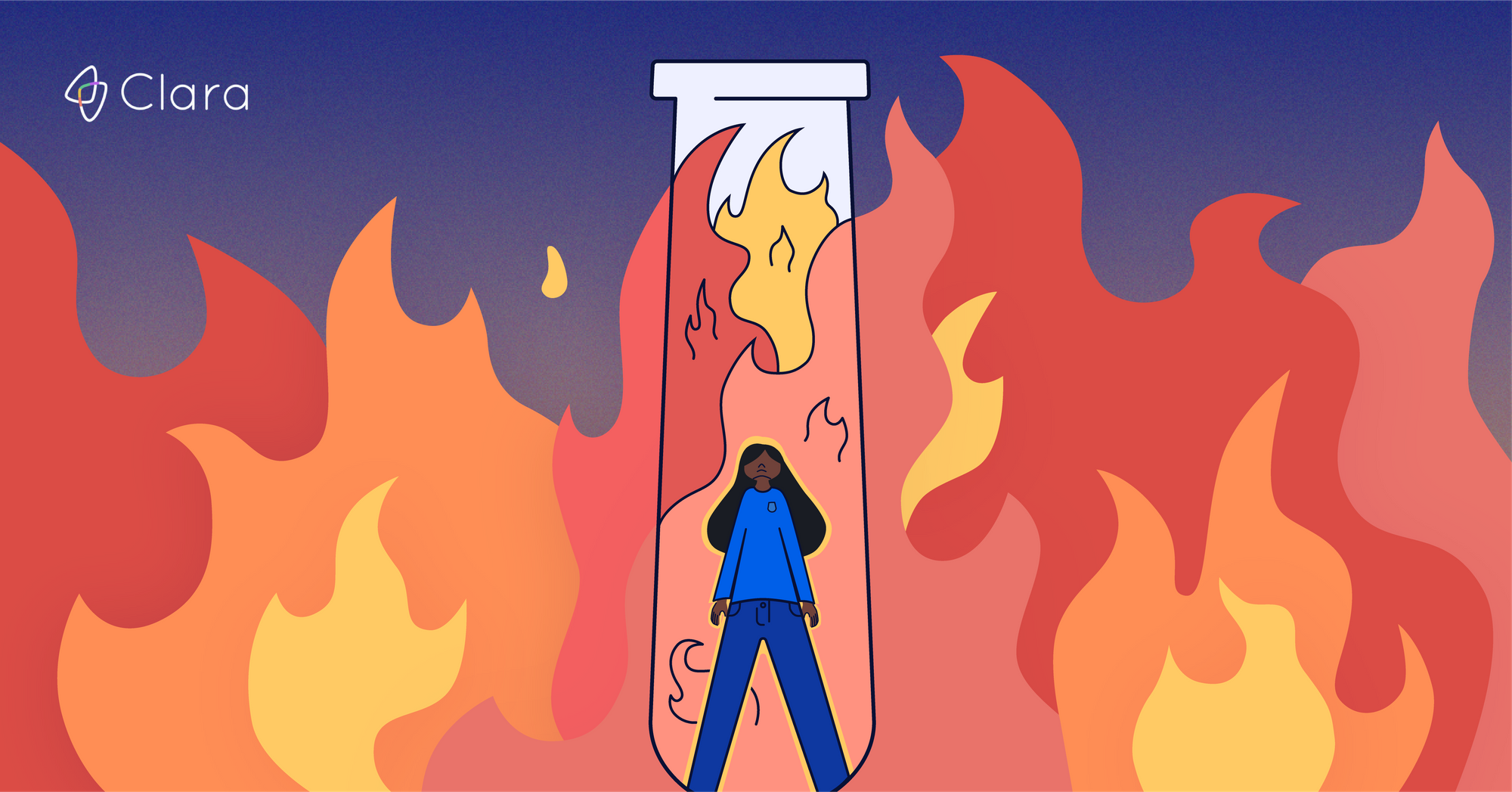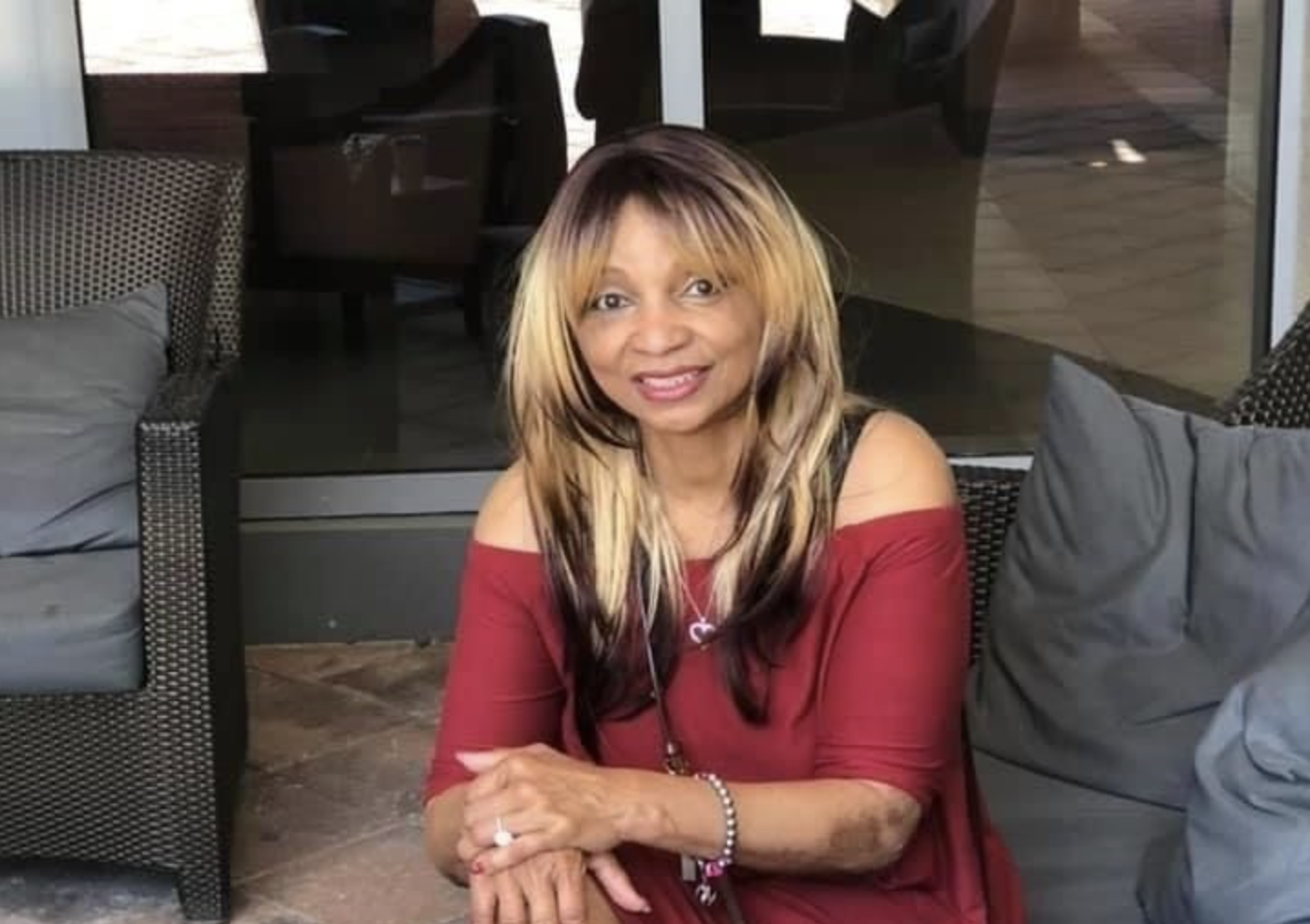In this Patients Have Power episode, Lilly and Aaron break down a renewed effort to undermine the Affordable Care Act by stripping out the legislation's protections for those living with pre-existing conditions (a list which includes...acne and...(checks notes) pregnancy?). They also chat about the new Right to Try legislation that has recently passed and the various thoughts the patient and pharmaceutical communities had about it.
Below is a transcript for your reading pleasure!
Lilly Stairs: Hi everyone, welcome to the Patients Have Power podcast. We're here with Aaron.
Aaron Jun: Hello.
Lilly Stairs: Wow. This has been a whirlwind to get to this podcast.
Aaron Jun: Yeah, jam-packed end of the week last week.
Lilly Stairs: Yeah. So this podcast was originally just going to be on Right to Try, we did the Twitter chat last week. We are excited to talk about that, but we decided that we wanted to take some time to actually bring in the conversation now happening around pre-existing conditions.
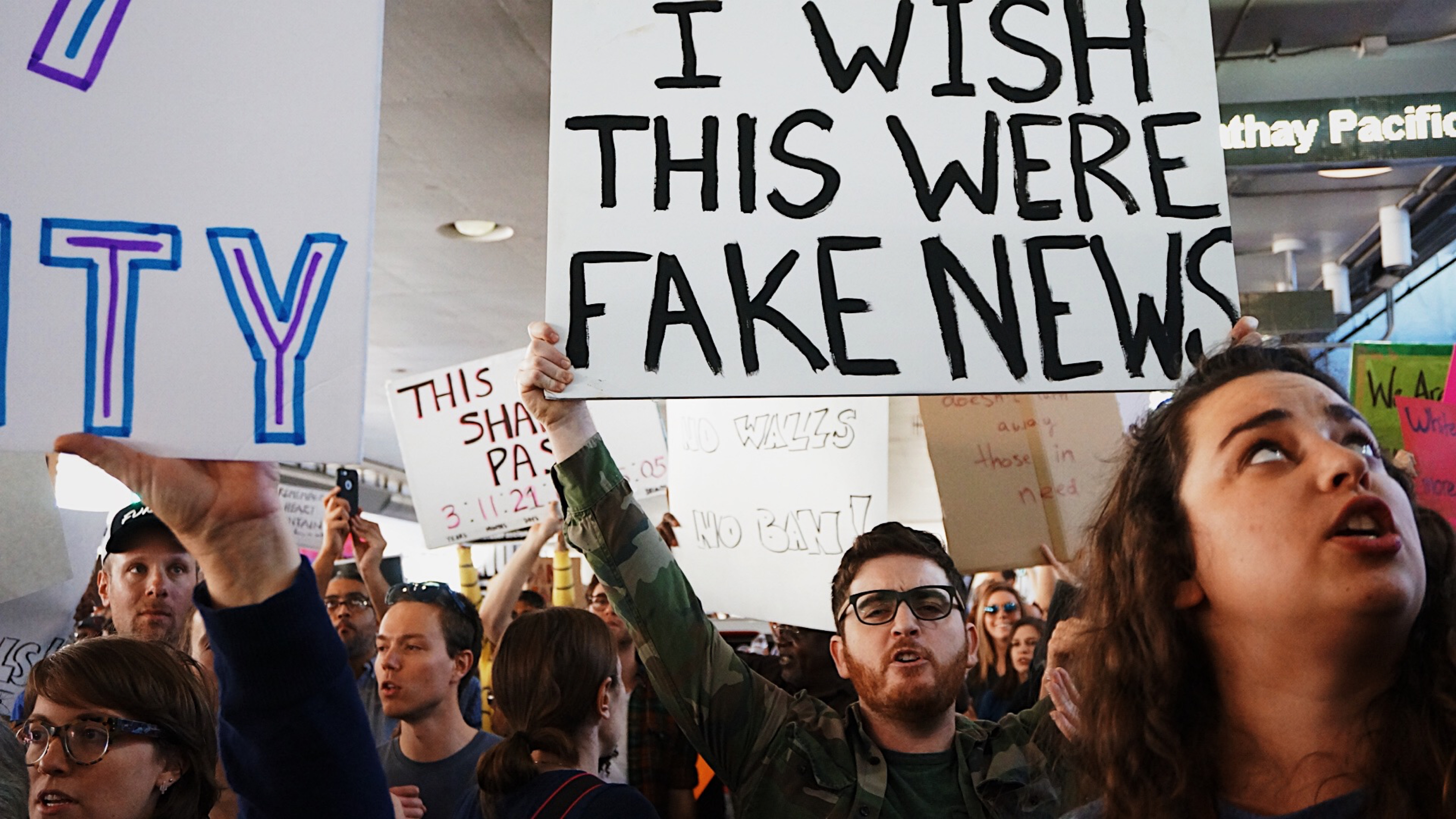
Aaron Jun: Let's talk a little bit about how we got here. I think it was a pretty calm Friday afternoon, when we saw the news break.
Lilly Stairs: I cannot believe that this conversation is back in the news. I'm actually in shock and we're going to walk you through what this means.
I don't remember how long ago it was, but you might recall people posting "I Am A Pre-existing Condition" everywhere on social media. It was a really, really great movement around it and all of a sudden the conversation has opened back up. What's going on here? Why are we talking pre-existing conditions again?
Aaron Jun: On Friday afternoon, the Trump administration moved to sue the federal government along with 20 state governors. Is that right?
Lilly Stairs: Well, what happened was there were actually 20 conservative States led by Texas, who are arguing that the ACA is unconstitutional in its entirety because one piece of the ACA, the individual mandate, was revoked.
Aaron Jun: The individual mandate so attacked, or the penalty that you would get charged for not having insurance got repealed in November or so.
Lilly Stairs: In December in the big tax reform bill that came out back in 2017, a year ago. Well not a year ago.
Aaron Jun: Seems like a lifetime.
Lilly Stairs: Yeah.
Aaron Jun: So anyway, it's back in the news because there is this argument now working through the courts, where they are trying to argue that the entire thing is now unconstitutional.

Lilly Stairs: Well and the problem is that the administration is refusing to defend the ACA, which is actually really unheard of because it's pretty standard for current administration to support what laws are already in place. So the Justice Department is not stepping in to defend these laws.
Aaron Jun: Yeah. It's not looking great but the law of the land still remains the ACA, so all pre-existing conditions are still covered and protected.
Lilly Stairs: Yeah. Let's actually say that with the ACA, for those of you who don't know, known as the Affordable Care Act. There are some regulations and protections in place for people with pre-existing conditions.
What does this mean? This means that insurance cannot refuse to provide care, or insurance, to somebody living with a pre-existing condition. It also means that they can't hike up costs and premiums because somebody is living with a pre-existing condition.
Aaron Jun: Right. For instance, you have Crohn's.
Lilly Stairs: I have Crohn's, I've got psoriatic arthritis, I've got psoriasis.
Aaron Jun: It's a whole thing.
Lilly Stairs: It's a whole thing, there's a list. There's more but we'll just leave it at that for now.
Aaron Jun: So you cannot legally be charged any extra than say me.
Lilly Stairs: Yeah. Thank God because I didn't do anything to deserve this. I just, these diseases happened upon me. There is nothing that I have done to bring this upon myself.
Aaron Jun: Some statistics here...From the Crohn's & Colitis Foundation's official statement on Healthcare Coverage and Access:
- 88.9% of respondents in a recent survey of IBD patients said it's already difficult to afford coverage.
- 55.3% were turned down by an insurance company, and
- 51.8% were charged a higher rate because of their pre-existing condition.
Lilly Stairs: This was prior to the ACA being put into place and that is just ...
Aaron Jun: It's appalling.
Lilly Stairs: Appalling that these patients who are already living with so much stress, and trying to get their treatment under control, they're being denied coverage, which means their disease is just progressing and getting worse. You know what? That one ends up happening then, patients end up in the ER. Then they go bankrupt because they can't afford to pay the ER bills, and they don't have insurance because insurance won't cover it.
Somebody tell me how that makes sense? I'm just mind blown by all of this.
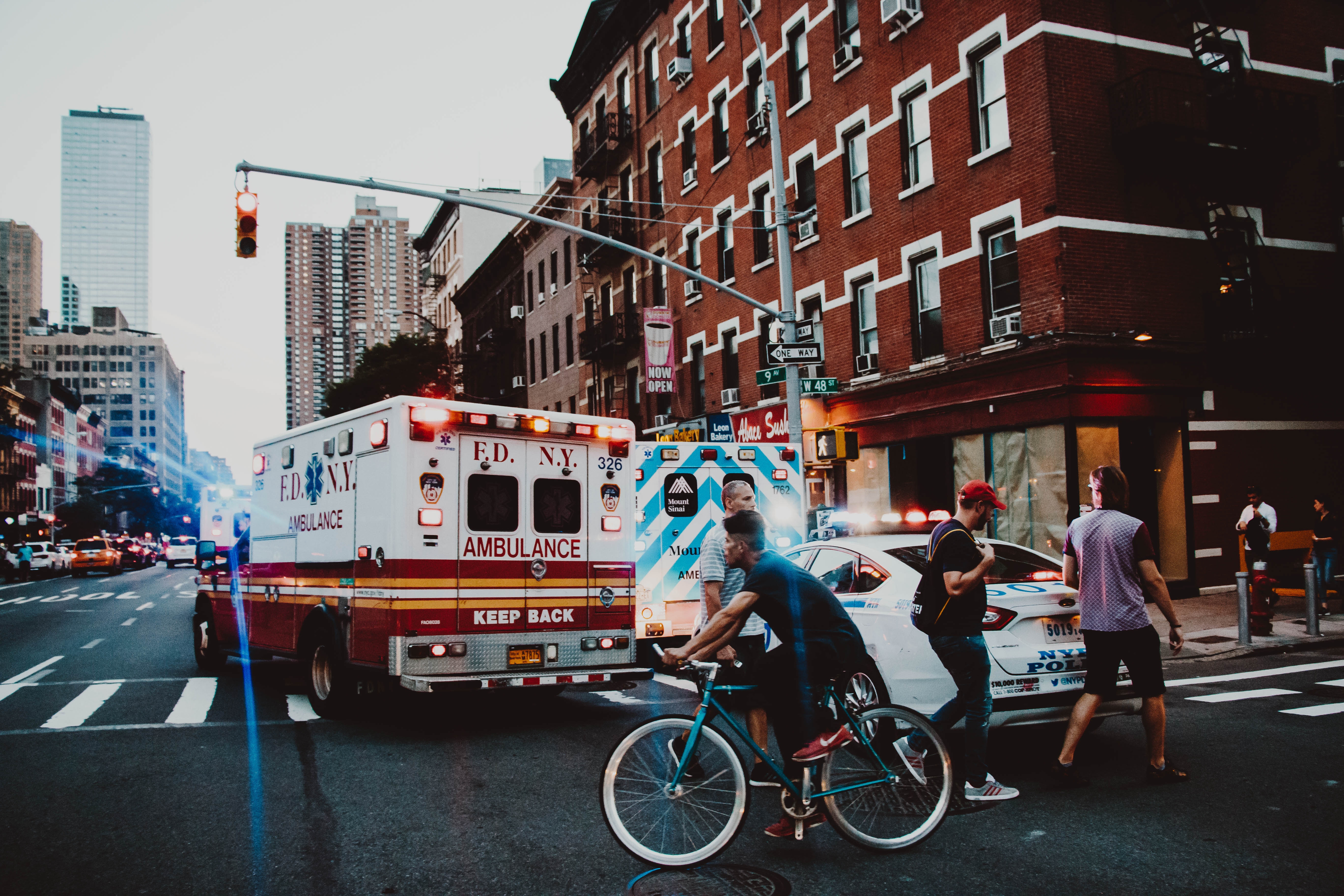
Aaron Jun: I think there's a common argument from more fiscally conservative sides, that argue that health care should not be granted universally because of the individual costs that all accumulate and get handed off to so-called healthier folk.
But the fact of the matter is, we all pay for this stuff one way or another and if a hundred what is it? 130 million adults under the age of 65 have pre-existing conditions.
So if we're talking about 130 million people with pre-existing conditions who somehow get thrown off of insurance, it's not going to be a case in which we or someone like me who doesn't really have anything happening-
Lilly Stairs: Theoretically.
Aaron Jun: Theoretically, it's not like I'm getting off scot-free. I'm still paying for this somewhere down the line.
Lilly Stairs: Also, I think what's really important to remember is that yes you could be healthy today, but what about in a year from now? Or two years from now? Or ten years from now? Really not everybody gets away with being healthy their whole lives.
We often need to use the health care system at some point, you cannot avoid it. So actually even revoking this individual mandate is bananas to me, but we don't need to get into that right now.
We'll just leave it there.
Aaron Jun: Well and the wild thing is, Lilly was kind enough to do some more research beyond what we had both read, and the wild thing was that the trade association, sorry let me get this completely straight. The Insurance Trade Association supports pre-existing condition protections, so I'm not entirely sure which cohort of America this is meant to protect.
Lilly Stairs: Well it's funny because we are always giving insurance companies a hard time and then there's time there really in the right here. In polls, in really reputable polls, I think it's a Kaiser tracking poll.
Back in June 2017, majority Republicans and Democrats support protections for people with pre-existing conditions.
You know what's even interesting is that back when Trump was actually first elected in a 60 Minutes interview, he said that this was one piece of the ACA that he actually liked...the protections that were in place where people with pre-existing conditions, but now I'm not so sure what happened there.
Aaron Jun: It's going through the courts right now, I think one thing that everyone needs to do is get activated.
If you know someone and I promise you, you know someone with a pre-existing condition. I promise you, you will know someone who has to go through the healthcare system.
If this bothers you at any level and I think it really ought to, if you know people in general if you know anyone.
Lilly Stairs: Well yeah. Just an FYI, it's not just people with serious chronic conditions.
Aaron Jun: Right, yeah.
Lilly Stairs: That this fits, it's ... the list is long.
Aaron Jun: What are some pre-existing conditions that are on the list?
Lilly Stairs: If you're pregnant. So if you are going to bring life into this world, pre-existing condition.
Aaron Jun: Acne was a pre-existing condition.
Lilly Stairs: Acne, so those little pubescent children causing problems, wreaking havoc in society.
Aaron Jun: Right. It's hard enough to have acne and go to the middle school dance. Now you might get thrown off in 2020.
Lilly Stairs: No, no coverage, no acne creams.
Aaron Jun: Again if this bothers you and it really should, it will impact you or someone you know, call your representatives, call your Congressman, call your Senators. Jam up the phone lines and make sure that your voice is heard.
Lilly Stairs: Emails, texts, these are all things that you can do and we'll try to list some resources along with this podcast, when we do the write-up that you have some quick and easy links that you can go to and contact your representative.
Aaron Jun: Well and there's one guy that I've been following on Twitter that's been there really, really helpful. He calls himself Medicaid Matt, he's a lawyer who has a chronic illness and now he's an activist and also still a lawyer, a lawyer activist who fights on behalf of patients.
So if you want to shoot him a follow, it's @mattbc, and he's been a fantastic follow, really great information.
Selfishly, the way I framed this in my mind is here at Clara, we have this great patient advocacy program run by Lilly, and if somehow Lilly couldn't afford insurance or couldn't afford care at all-
Lilly Stairs: Or was just denied.
Aaron Jun: Right or was denied care, I'm not entirely sure what would happen to my life personally. It would be such an influx of extra work, that I don't think any human could be able to take care of it and then all of a sudden Clara is gone.
Lilly Stairs: Yeah. The podcast, the rating just go way down.
Aaron Jun: Again, you know someone with a pre-existing condition, you will know someone, you might be one, get involved. Make your phone calls, make your ... Send your emails and make your voice heard.
Lilly Stairs: Tweet, social media is really impactful now. We know our President also loves social media, so I think-
Aaron Jun: He's on there.
Lilly Stairs: Go ahead and tweet away, we will be continuing to talk about this as it evolves. I'm really hoping that this discussion just gets to stop, and we get to keep ... It doesn't become a big issue but right now we're following it, and we'll try to keep you in the loop on it.
Aaron Jun: This is one of those cases where there just isn't another side, unlike this next topic that-
Lilly Stairs: I guess this topic, that was a great transition and I appreciated that.
Aaron Jun: I've been working on that. I think it went pretty well.
Lilly Stairs: Debatable.
Right to Try. We have been following this one for a couple months now, and we've been talking about doing a podcast on it but we really didn't feel we were ready.
We didn't want to speak too soon, we wanted to make sure that we had all the facts. We really wanted to also go to the patient community and talk with others, and the biotech community and the insurance community. Find out what people are thinking about Right to Try, because it shouldn't just be Aaron and I's opinion that we're bringing here.
Lilly Stairs: We want to have everyone's voice at the table. It's a complex issue, Right to Try.
So what is it? Right to Try allows terminally ill patients to access therapies that are not currently approved or available.
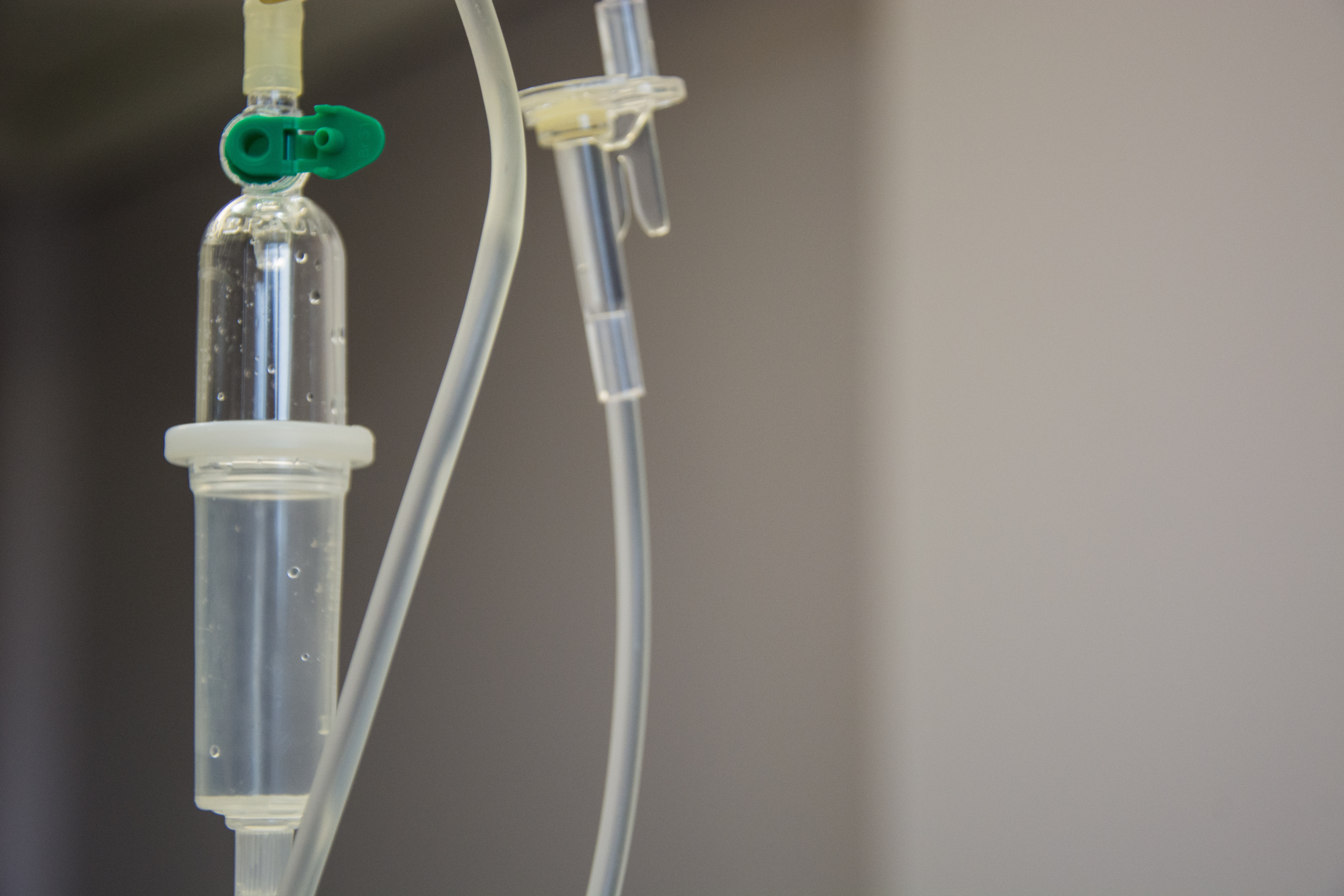
So as we've talked about before, treatments have to go through clinical trials and then they get approved by the FDA or not approved. But the ones that are approved and on the market, are the ones that are available to the general public.
So one would say, well isn't that what clinical trials are for?
Aaron Jun: Right to Try.
Lilly Stairs: The Right to Try. You try the clinical trials.
The issue is that not everybody will qualify for clinical trials. They're pretty specific in who they let in because they want to make sure that the drug is going to be or the treatment, or the therapy, is going to be the right fit for the patients who are entering this trial.
What's great is that that allows for hopefully better outcomes for those patients, but we also know that there are outliers and patients who may be you're presenting differently and now they're not getting access to these treatments, and potentially could die before that treatment is approved.
Lilly Stairs: So there's a couple of different philosophies, not a couple...there's two different philosophies on this, there are proponents and opponents.
I will say first of all, and I think we didn't mention this is that Right to Try was actually recently signed into law just a couple weeks ago. So this is fresh off the press and at this point, there's not any turning back in the near future.
It's important to us that we talk about what we liked about it, what we didn't like about it and what patients think about it, and what are the steps moving forward.
Aaron Jun: Right. So on the proponent side a couple of major points. Essentially the argument stems from not wanting to have so many regulations in place between a very sick patient, down to perhaps her last option and potential treatment.
Like Lilly was saying, clinical trials are actually quite exclusionary and quite restrictive in who they allow into the trials at any given phase. So most patients are excluded from clinical trials because of these criteria.
Aaron Jun: There was a study on asthma trials that found that on average, only 6% of real world asthma patients were considered "healthy" enough to join any one of these clinical trials. So again pretty restrictive access there.
Of course, there is something called Compassionate Use of drugs. That's a pathway through which patients who are very sick can access new therapies without going into clinical trials.
Lilly Stairs: Right and that process involves filing some paperwork with your physician, and that process was actually recently streamlined because people were saying it was too cumbersome.
It's actually recently been streamlined and that goes to the FDA. The FDA will then say yay or nay, 99% of all requests that went through to that FDA were approved in the past year. So that is a way that exists as an avenue to access these treatments.
Lilly Stairs: The catch here is that once it's approved by the FDA, the patient and physician need to go to the sponsor company, or the biotech, or pharma company, who makes the drug. They also need to approve that the patient can have access to this drug.
Another catch, the pharma company is not responsible for paying for this medicine, and so the patient could be financially liable for this.
Aaron Jun: Right. So the proponent argument here is that Compassionate Use even in its current form, is too cumbersome and complicated for anyone to really recently navigate.
Lilly Stairs: And that people should have the fundamental right to make that decision without the government getting involved. To have the Right to Try.
Aaron Jun: So again, the government regulation slows down promising treatments. This would be the argument, gets in the way with oversight that's unnecessary. Clinical trials are too restrictive and compassionate use is too cumbersome to get through. So those are pretty much the big points on the proponents.
Lilly Stairs: Yeah. Yep that was good overview.
Aaron Jun: Yeah, thanks.
Lilly Stairs: On the opponent's side, there's a couple of different arguments happening here too. One of them is that it's providing false hope to these patients.
Here's the issue, it's allowing access to drugs that have made it through a phase one study. We know there are some preclinical studies and then there's phase one, two, three before you get to approval. So this is drugs that have gone through phase one. Unfortunately, only about 13 to 14% of drugs that go through phase one actually make it all the way to the approval phase.
Lilly Stairs: So the likelihood that this treatment is really going to be effective is a 13 to 14% chance.
The problem is that the patient is potentially financially responsible for this, because yes, you've cut out the FDA out of the equation but the patient still has to get clearance from the sponsor company.
The sponsor company can say yay or nay but they can say yay, and say yeah but we can't afford to pay for it. I'm not sitting here saying that pharma and biotech companies should pay for every patient who tries to access drugs via Compassionate Use or Right to Try.

Lilly Stairs: I think it's complicated. We work with a lot of companies, some who are very small biotech companies who are coming up with these innovative therapies, and they simply don't have the funds to be giving away free drugs outside of clinical trials.
So that's a piece of this that concerns me, and I also get concerned that patients and families are going to go bankrupt because they're going to exercise their Right to Try. Then the patient's going to try this medicine with a very low likelihood of working, and they have now spent hundreds of thousands of dollars on it, and have left their family in debt.
Aaron Jun: Yeah. That's one of my big hang-ups here as well. It seems like another instance of this health care system in our country, offloading some of the responsibility, some more of the responsibility onto the patient and onto the patient families.
I don't think it's any crazy controversial thing to say that our country gives a huge portion of the burden to those who got sick, and those families who are taking care of those who got sick. This just seems to be one more case in which we're not looking at the pathways that exist within the system.
Aaron Jun: So the FDA approval through Compassionate Use and then going to the pharmaceuticals. We're not looking at those existing pathways and saying well how can we improve things, or streamline things, or what have you. Instead we're saying well let's just get the government the hell out of the way, and then let everyone have the free choice which sounds great on its face and Right to Try sounds great on its face, but the the underpinnings are a little concerning to me.
Lilly Stairs: Yes. I think so and it's one of those bills and I've been calling it this vanity bipartisan. It sounds wonderful, all sides are getting involved and people are proponents of it but when you really pull back the layers, there are some concerning pieces to this.
You can tell where Aaron and I, where we stand. We're not being particularly unbiased here.
Aaron Jun: If you went to the Twitter chat, you know how we-
Lilly Stairs: Yeah, you know how we feel but we have taken a lot of time to look at both sides, because we weren't sure where we stood when we first heard about this a few months ago.
So the other thing that I will say is, there is some concern about what happens when a patient gets access to a drug via Right to Try.
If there was to be an adverse event, if the patient was to die, that could affect the drug and the outcomes for the patients who are currently in the clinical trial.
It creates bad press and potentially that could prevent that drug from getting out to the general public, and saving a lot of other patients later on. So that's just something else to consider in all of this.
Aaron Jun: So the opponent points I guess then would be, it can foster false hope. Insurance in pharma are not required to cover any of the cost therefore, the financial burdens placed on the patient themselves.
Compassionate Use already approves 99% of requests and again limiting that potential good outcome of other drug that might already be in trial, if there were to be some horrific adverse event. It's usually publicized.
Lilly Stairs: Again, solid overview.
Aaron Jun: Yeah. I know.
Lilly Stairs: I want to take a moment to, now that you've heard Aaron and I's strong opinions, I would like to take a moment to share some quotes from the Twitter chat that we actually conducted last week, and where we had a really a wide array of people from across healthcare.
We had a lot of advocates, we had some people from biotech, we had nurses. So we really saw a lot of different perspectives and a couple of people who were more in the proponent side. I don't want to say they were totally ... Some people who were in this chat were a little middle of the road, and had different comments.
Lilly Stairs: So I don't want to put them in a bucket but, Brooke Abbott, she goes under the name Crazy Creole Mommy. I adore her and I actually really look to her for a lot of policy decisions. She said,

"I like the bill. I think there is a lot of vagueness in the text, but I think it could lead to better control of over treatment by doctor and patient. I also think it could open the door to bigger research budgets, and more awareness for trials."
That was a Brooke.

Lilly Stairs: Kelby Peachy, she goes by Peachy Pains on Twitter, we'll link to all this as well.
"When you are on your deathbed, what wouldn't you do? Especially if the FDA says that a drug is safe enough to be used in trials on humans, than it's safe enough for a dying person to make their choice about whether or not they would like to try it."
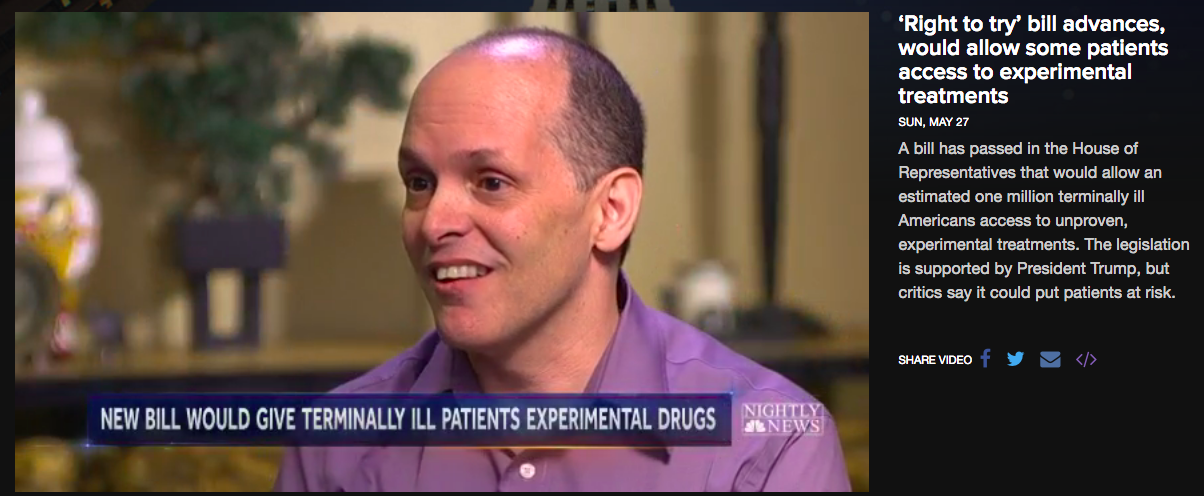
Lilly Stairs: Finally, I want to share one from Frank on the proponent side who he actually was featured on NBC Nightly News, talking about Right to Try. He's been really, really active in this. Frank is one of our Breakthrough Crew Ambassadors and he's been a phenomenal advocate for the cause.
"I am for Right to Try. I am a patient that is terminally ill, I was declined for five clinical trials and compassionate use wasn't so compassionate for me. I was denied two times."
So this is somebody who has been failed by the system and is actively supporting Right to Try. A couple of the opponent's sides, do you want to share some of those?
Aaron Jun: Yeah, sure. Kim Hartman who goes by Automatic RN.
Lilly Stairs: AutonomicRN.

Aaron Jun: Sorry, Autonomic. I don't know. We'll link to all this obviously, so just look at the link. I don't know what to tell you, it's on piece of paper. So Kim she says,
"I'm split. I'm not 100% sold on it but not all against. Having another option for patients and families is nice, however the risks that go along with it and circumventing the FDA, concerns me. Some processes exist for a reason."

Aaron Jun: Heather says,
"I've been strongly opposed to Right to Try, it uses patients to advance the goal of weakening the FDA. I'm also concerned with a false narrative that the government is keeping cures from patients.
Now that Right to Try has passed, it's important for patients to be educated about their options, clinical trials and a realistic picture of what to expect. I could help some but there won't be a wave of cures."
One more that I'll share here is Kevin, who actually comes from the world of pharma. Had a lot of fascinating points to make but this one really resonated.

Aaron Jun: He says,
"I continue to be opposed to Right to Try. It adds, no new ability for patients to access experimental treatments. It has created a confusing parallel path and it only provides sound bites and photo ops."
Then he goes on to say,
"The vast majority of physicians are not equipped to know enough about the existence and data around experimental compounds, let alone to manage the unknown benefit and risk of treating with them. So simple question, what dose will they prescribe? In reality, the decision still remains with the sponsor company. They know more about the experimental compound than anyone, they carry the risk despite this legislation. FDA is not the bottleneck."
Lilly Stairs: Interesting. So as you can see, we had a really robust discussion and we'll be sharing that. We also pulled together some resources, sharing the proponents side and the opponents side.
I'm really interested to see how this evolves over the next couple of years. The usage of Right to Try versus Compassionate Use.
I will say that whatever it may be, I hope to see reform across one or both of them because right now I don't think the system is as efficient as it could be. I appreciate a Brooke's sentiment that she hopes it opens some doors to have additional conversations about it.
Aaron Jun: I totally agree with that and the good news is, midterm elections are coming up in November. Big election year for all of America.
Lilly Stairs: I will just say in some of the headlines in doing research for the podcast this morning, all of the headlines are now saying that health care is going to be the issue that defines the midterm elections.
Aaron Jun: Yeah. It makes total sense. Again, it impacts everyone. It impacts you, it impacts me and Lilly and everyone. I can't stress to you how much my life would get severely impacted, if Lilly were too sick to work. It would be shut off.
Lilly Stairs: So just do this for Aaron, that's all I care about. It's not about me, it's about Aaron's work life balance.
Aaron Jun: The good news is that this is now on the ballot and there are no shortage of resources, so we'll link to all of these as much as we can.
I think there's a clear challenge to the patient community, to the advocate community, to anyone who works in healthcare, or biotech, or health tech, like we do. Get involved right, get involved.
Find those candidates who are speaking the language that you want to hear, and back them. Run for office yourself if you're able, if you're not maybe ...
Aaron Jun: If you have the energy for it, phone bank for one of these candidates that you really believe in. Get involved in online social media, make your voice heard.
Make your phone calls, facts, show up and get your voice into the discussion because that's the only way that these folks are going to listen to you.
So that's what I hope to see in 2018, and I think it's going to be a really cool thing if we can activate all this energy in the patient community.
Lilly Stairs: We're going to help you get there so stay tuned, keep following us on Patients Have Power. We're going to keep talking about it, we're going to keep educating and bringing this information to the forefront because this is the foundation.
Policy sets the foundation for everything in healthcare, and how it impacts our day to day lives. So thank you all so much for joining us and chatting with us about these issues. Definitely feel free to leave us a comment.
Let us know what you think and tell us what other topics you want to hear about. Thanks everyone.
Aaron Jun: Thanks guys.
Resources for contacting policymakers
1: Call Your Representitive
www.5calls.org makes it simple to make your voice heard. Type in your zip code, and the site will find you your representatives and their phone numbers. It will even surface the issues of the day and scripts for you to follow.
2: Text Your Representitive
Resistbot Text the word RESIST to Resistbot on Telegram, Messenger, Twitter or to 50409 on SMS* and Resistbot will find out who represents you in Congress, and deliver your message to them in under 2 minutes.
3: Tag Your Representative on Facebook
Do you notice when somebody tags you on Facebook? Chances are, your answer is “yes” — and that goes for your representative, too.
4: Tweet at Your Representative
Every action counts — even if it’s just a tweet. If you have Twitter, take a moment to tweet at your representative.


